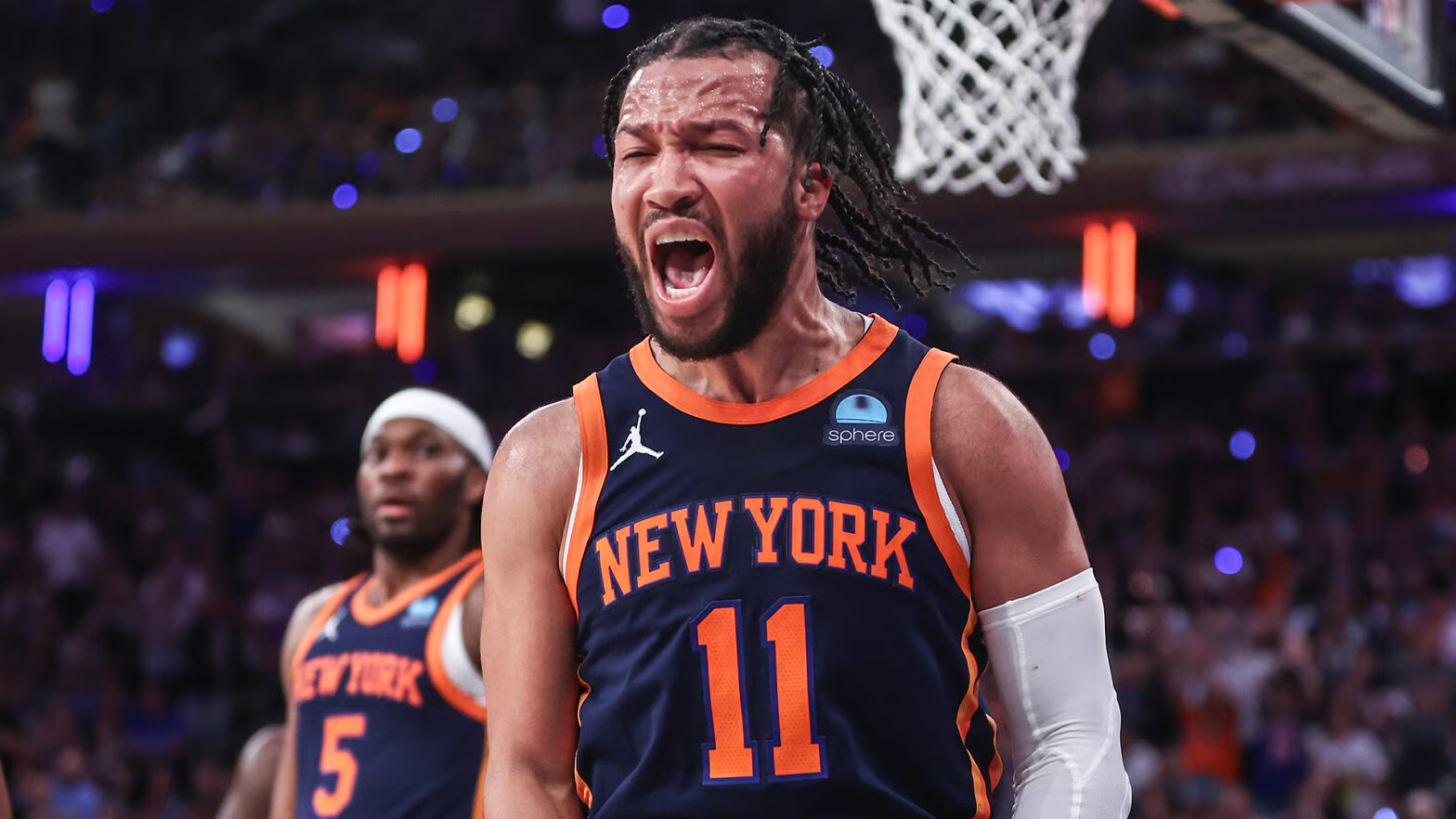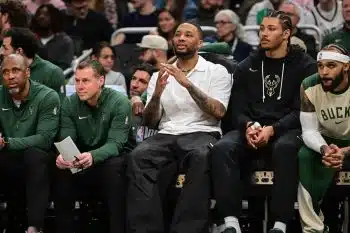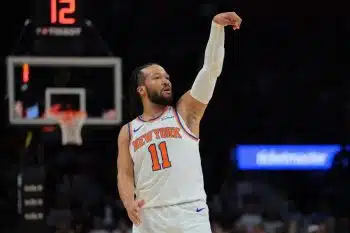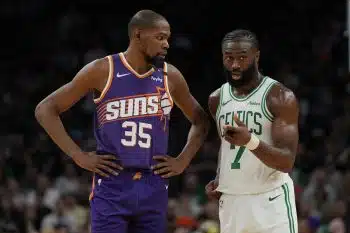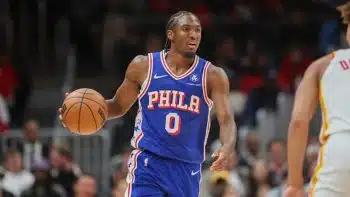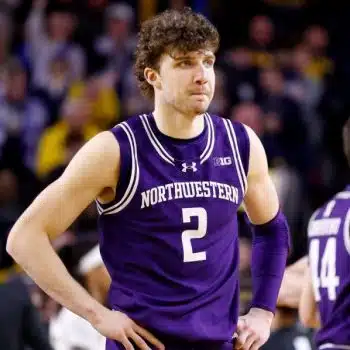NBA
Six Underrated NBA Point Guards
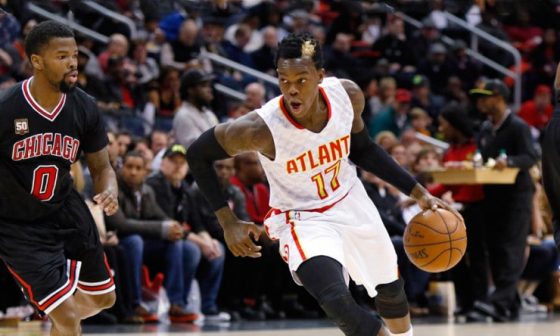
With the NBA regular season wrapping up in the coming days, much speculation will center on the candidates for end-of-season awards. While so much focus is on the season’s most recognized performers, Basketball Insiders will take a look this week at players, coaches and executives whose contributions and accomplishments have flown under the radar. We’ll start with today’s look at six underrated NBA point guards.
6. Jeremy Lin
While it’s difficult to gauge Jeremy Lin’s value to the Brooklyn Nets since he’s only appeared in 31 games due to injury, his absence has been felt in Charlotte. The Hornets are in imminent danger of missing the playoffs, and the disappointing play of backup point guard Ramon Sessions is an obvious factor. Sessions ranks 67th among point guards in Real Plus-Minus, while Lin ranks 26th for Brooklyn and ranked 32nd as Kemba Walker’s backup last season.
The Nets have gone 10-21 in games for which Lin has been available, and 8-38 in all other games. Brooklyn would still be on pace to miss the playoffs if Lin had been available for all 77 games and the team maintained the same won/loss ratio. A lot of that has to do with an overall talent deficit after the team traded starting power forward Thaddeus Young for the draft pick that was used on promising rookie Caris LeVert. However, Lin remains a legitimate rotation NBA point guard who can help a team if he can only stay healthy.
5. Dennis Schroder
Perhaps the most surprising entry on this list goes to Dennis Schroder, the Hawks’ point guard who allegedly campaigned for Jeff Teague’s starting job and now stands in danger of missing the playoffs, something Teague has never done. With Schroder at the helm, the Hawks went from 22nd in turnover ratio in Teague’s final season to 28th currently. While Teague ranks 12th among NBA point guards in assist ratio for the Pacers, Schroder is tied with Orlando’s D.J. Augustin for 42nd.
Even more infuriating than the endless stream of miscues with the ball has been Schroder’s worse-than-advertised defense. Among 248 NBA players with at least 1000 minutes through March 19, Schroder ranked in the bottom 10 in defensive differential (the difference between a player’s off-court and on-court defensive ratings).
So how can Schroder be underrated if he has stumbled so badly in his first season as a full-time starter? Firstly, it must be understood how thoroughly Hawks coach and GM Mike Budenholzer set Schroder up to fail via last summer’s personnel moves. While Isaiah Thomas is enjoying a career year alongside Al Horford and the Rockets have soared to a top-three record since Dwight Howard departed, Schroder must orchestrate an offense that suffers from too much predictability with Howard on court. In losses since Atlanta traded Kyle Korver to the Cavaliers, the Hawks score 102.7 points per 100 possessions with Howard on the bench but just 93.3 with Howard on the floor, easily a team-worst offensive differential. On top of that, the Hawks entered the season with only two point guards, including rookie Malcolm Delaney. A veteran presence at the position might have smoothed Schroder’s transition to starter.
Secondly, any discussion of Schroder’s ceiling must include an analysis of Budenholzer’s head-scratching lineup decisions during last season’s four-game sweep in the second round to those same Cavs. Schroder was one of only two Hawks with a positive net rating for the series, and yet Budenholzer played him only 80 minutes. In Game 1, Schroder erupted for 27 points on 50 percent shooting that included five of ten three-pointers. For reasons that defy comprehension, Budenholzer played Schroder fewer than 15 minutes in Games 2 and 3. Schroder then scored 21 in 26 minutes in Game 4, but it was too little, too late.
Teague concluded his Hawks career with five points and two assists in 22 minutes in Game 4. He would later claim on Instagram (before deleting the post) that he played the entire 2015-16 season with a torn patella tendon. If Teague was so hobbled, why would Budenholzer play him more minutes than Schroder, who was on fire when given significant minutes? While Atlanta was +4.5 per 100 with Schroder on court in the series, the Hawks were obliterated by 24.4 per 100 in Teague’s minutes. In a series in which the Hawks held fourth-quarter leads in three of four games, this question matters.
4. Elfrid Payton
Speaking of head-scratching coaching decisions, we turn to Magic coach Frank Vogel’s brief demotion of Elfrid Payton to backup point guard. After starting over 60 games in each of his first two seasons, Payton has started only 53 of 77 games so far this season. The other 20 starts have gone to D.J. Augustin, currently 42nd among point guards in RPM. Payton, meanwhile, is 18th among point guards in Player Efficiency Rating and 33rd in RPM, which rates him solidly as an NBA starter.
Payton has certainly had ups and downs throughout his career, but it seems he’s taken a disproportionate amount of blame for Orlando’s failure to meet expectations. Payton is averaging career highs in points, rebounds, PER and effective field goal percentage while his turnovers are a career-low. A better target for that blame would be Orlando GM Rob Hennigan, who traded three rotation players — Victor Oladipo, one of the NBA’s most promising two-way wings; Ersan Ilyasova, who has been among the net rating leaders for the 76ers and Hawks; and 2016 11th pick Domantas Sabonis, who has been among this season’s most productive rookies — for less than a season’s rental of Serge Ibaka.
After shooting an encouraging 32.6 percent from three last season, Payton has plunged below his career average to 26.8 percent this season. The inability to stretch the floor has been a major knock on Payton, and it remains a concern. However, it’s not a sufficient reason to give up on a third-year player who flashes a lot of talent. If Orlando’s front office hadn’t grown impatient and sought a short cut to the playoffs, Payton would have a lot more talent to work with.
3. Patrick Beverley
When the old dog Mike D’Antoni took over as Houston Rockets coach and decided to try some surprising new tricks, Patrick Beverley was put in the position of accepting a demotion for the betterment of his team. After Dwight Howard declined his player option and departed to the Hawks, Houston signed Ryan Anderson to a massive four-year, $80 million contract and committed to the modern era of floor spacing. Lost amidst the fanfare of James Harden’s legitimate candidacy for NBA Most Valuable Player is the story of the player Harden replaced as Houston’s starting point guard.
Beverley, the gritty, old-school, defensive-minded guard who recently decried the practice of resting players, handled the change in role exactly how you’d expect him to: He never complained and continued to give the Rockets whatever was asked of him. While his 9.3 points, 5.6 rebounds, 4.1 assists and 1.5 steals per game seem solid-if-unspectacular, a deeper look shows exactly what he’s meant in Houston’s ascent to a top-three record. Of the averages mentioned, all but points are a career-high.
Beverley’s 38.5 percent from three trails only Anderson’s 39.7 percent among regulars. Largely thanks to a defensive RPM that ranks second only to Chris Paul, Beverley ranks in the top 10 among point guards in RPM. If his value wasn’t obvious enough, Beverley erupted right on cue for a career-high 26 points with eight rebounds and nine assists to lead the Rockets over the Suns on Sunday as Harden missed his first game of the season due to illness.
2. Patty Mills
The Spurs are a team-best +13.1 points per 100 possessions with Patty Mills on court. With Tony Parker on court, San Antonio is +5.9, the worst net rating of any Spur with at least 500 minutes. Parker’s status as a starter seems like a lifetime achievement award at this point. This summer, San Antonio is going to have to deal with the fact that Mills could start for about half of the league’s teams. He’ll be making something close to starter money next season, even if it’s to continue his role as Parker’s backup.
1. George Hill
Nobody underestimated George Hill more than Pacers GM Larry Bird. Of the three teams that participated in the trade that sent Hill to Indiana, the Pacers and Hawks are in danger of missing the playoffs while the Utah Jazz has gone from the lottery to top four in the brutal Western Conference. Hypothetically, if the Hawks had dealt directly with the Pacers and swapped Teague for Hill, it’s hard to imagine the Hawks being only two games above the lottery line entering the season’s final weeks. Schroder could have used an extra season as an understudy to a point guard of Hill’s talent.
Hill has had his share of injury woes as well, but in 47 games he has started for Utah, the Jazz is 31-16. In games for which Hill was not available, Utah is 16-14. The proof is in the pudding. Hill has been underrated because he spent most of his career in the shadow of Paul George with the Pacers. Being an unselfish player, Hill was willing to run the offense through George and play a more complimentary, less ball-dominant role than we see from many of the league’s lead guards. The result is that we didn’t see what Hill was capable of … until the Jazz gave up a lottery selection to make him Utah’s team leader. The results speak for themselves.
Stay tuned to Basketball Insiders as we’ll be digging into underrated players at other positions — as well as coaches and league executives — throughout the week.
